It looks like you're using an Ad Blocker.
Please white-list or disable AboveTopSecret.com in your ad-blocking tool.
Thank you.
Some features of ATS will be disabled while you continue to use an ad-blocker.
share:
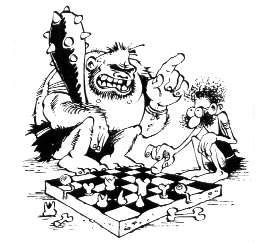 Since the time people have been throwing rocks
back and forth to each other, people have been asking why we play games. The answer that invariably comes up is that they hold value as escape
mechanisms. It seems as if people have felt the need need to escape reality for as long as there has been a reality with people in it. The fact that
gaming serves as a non-sequitur for mankind's daily struggles makes this explanation very plausible.
Since the time people have been throwing rocks
back and forth to each other, people have been asking why we play games. The answer that invariably comes up is that they hold value as escape
mechanisms. It seems as if people have felt the need need to escape reality for as long as there has been a reality with people in it. The fact that
gaming serves as a non-sequitur for mankind's daily struggles makes this explanation very plausible.  However, with new breakthroughs in quantum theory and
progressive physical laws (like holonomy), could it be said that gaming is actually emulating reality in a way that is just as accurate as the way we
emulate it in our fleshly bodies? In other words, which reality is more in line with the implicit nature and relationship between matter and
energy?
However, with new breakthroughs in quantum theory and
progressive physical laws (like holonomy), could it be said that gaming is actually emulating reality in a way that is just as accurate as the way we
emulate it in our fleshly bodies? In other words, which reality is more in line with the implicit nature and relationship between matter and
energy? To answer this question (perhaps to even understand the question properly), a person would need to tackle, and somewhat comprehend, yet three more questions. In this journey, we will discover:
 1. What, exactly, is the Holomovement physics model?
1. What, exactly, is the Holomovement physics model?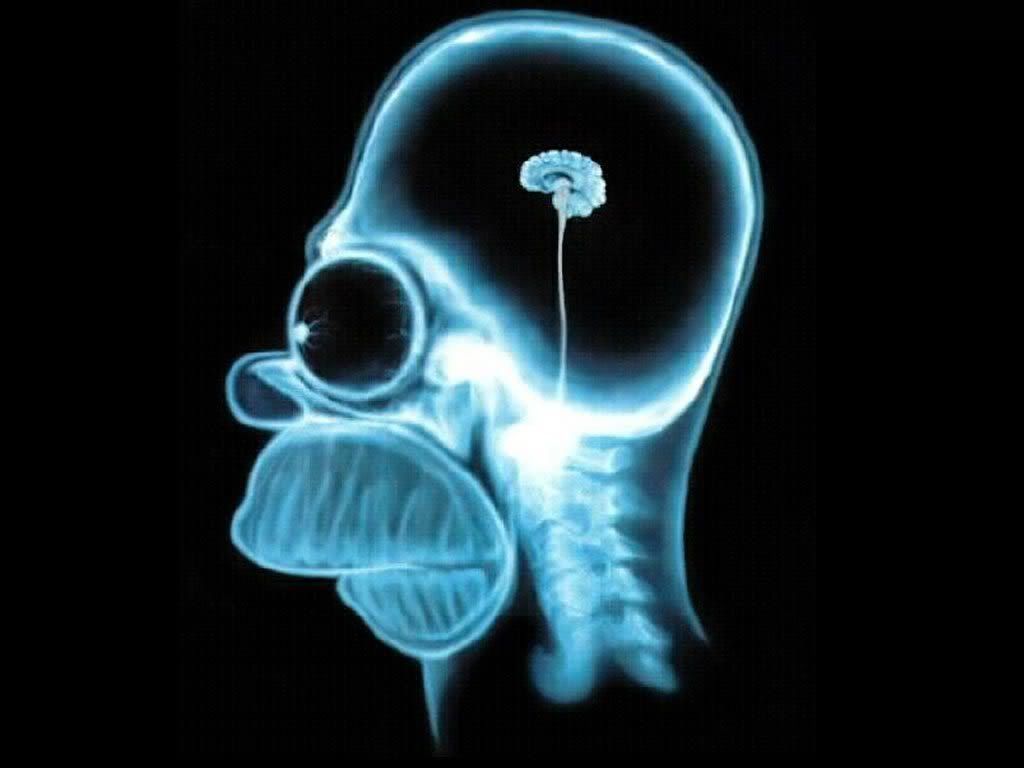 2. What happens to our
brains when we play games?
2. What happens to our
brains when we play games?  Do our brains react differently to
single-protagonist games (first-person-shooters, third-person adventures) as opposed to multi-protagonist games (some roleplaying games or real-time
strategy games) or even games without a protagonist at all (puzzle games, etc)?
Do our brains react differently to
single-protagonist games (first-person-shooters, third-person adventures) as opposed to multi-protagonist games (some roleplaying games or real-time
strategy games) or even games without a protagonist at all (puzzle games, etc)? This venture will consult the experts in each relevant field for the answers to these questions. Of course, for game-oriented questions, I consider myself (along with any habitual gamer) an authority.
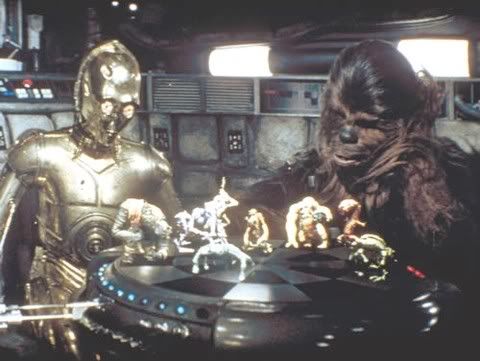 What,
exactly, is Holomovement and how does it relate to digital gaming?
What,
exactly, is Holomovement and how does it relate to digital gaming? 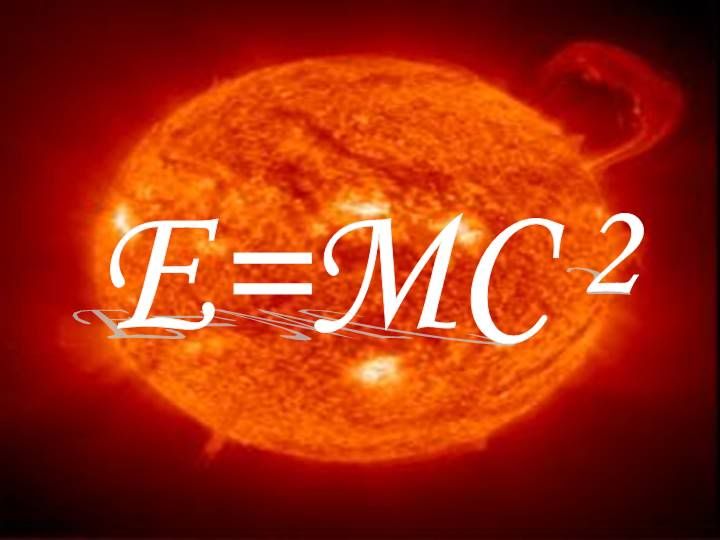 To address Holomovement physics,
a quick primer for quantum mechanics must be addressed. The term “quantum mechanics” was first coined by German physicist Max Planck (April 23,
1858 – October 4, 1947). According to Merriam-Webster, it is “a theory in physics based on the concept of the subdivision of radiant energy into
finite quanta and applied to numerous processes involving transference or transformation of energy in an atomic or molecular scale”. To put it in
simpler terms, it is the study of the relationship between matter and energy.
To address Holomovement physics,
a quick primer for quantum mechanics must be addressed. The term “quantum mechanics” was first coined by German physicist Max Planck (April 23,
1858 – October 4, 1947). According to Merriam-Webster, it is “a theory in physics based on the concept of the subdivision of radiant energy into
finite quanta and applied to numerous processes involving transference or transformation of energy in an atomic or molecular scale”. To put it in
simpler terms, it is the study of the relationship between matter and energy.  Holomovement theory is a field of quantum mechanic
study that is inspired by the way a human brain (and holograms) operate. It gives an explanation to several anomalies that the standard model of
physics does not. Several of those anomalies are directly related to personal perspective, which can be explained by the law of holonomy.
Holomovement theory is a field of quantum mechanic
study that is inspired by the way a human brain (and holograms) operate. It gives an explanation to several anomalies that the standard model of
physics does not. Several of those anomalies are directly related to personal perspective, which can be explained by the law of holonomy.  In contrast, if the ways our brains experience reality
were dictated by the standard physics model (our experiences as a purely biological function, exclusively dictated via signals in our brain), we would
experience things very much like a video game: detached, two-dimensional, and with all information coming in through one television or monitor.
Instead, we see, feel, and hear things “out there” and not in our brains. This is explained by the brain's amazing ability to read Fourier
transformative mathematical equations, a type of calculus invented by an eighteenth-century Frenchman named Jean B.J. Fourier.
In contrast, if the ways our brains experience reality
were dictated by the standard physics model (our experiences as a purely biological function, exclusively dictated via signals in our brain), we would
experience things very much like a video game: detached, two-dimensional, and with all information coming in through one television or monitor.
Instead, we see, feel, and hear things “out there” and not in our brains. This is explained by the brain's amazing ability to read Fourier
transformative mathematical equations, a type of calculus invented by an eighteenth-century Frenchman named Jean B.J. Fourier. This Fourier method of calculus allows the conversion of any object, no matter how complex, into a wave-form language. In his book The Holographic Universe, Michael Talbot describes an experiment conducted by two Berkley neurophysiologists Russel and Karen DeValois, providing direct evidence in the brain's ability to decipher Fourier math:
"To test their assumption they used Fourier's equations to convert plaid and checkerboard patterns into simple wave forms. Then they tested to see how the brain cells in the visual cortex responded to these new wave-form images. What they found was that the brain cells responded not to the original patterns, but to the Fourier translations of the patterns"(28).
Talbot went on to say “The brain was using Fourier mathematics—the same mathematics holography employed—to convert visual images into the Fourier language of wave forms” (28). I bet the majority of us had no clue we were all such math geniuses!
 With that revelation alone, a person could postulate
that our brains translate an implicit language into something we can experience, much like how a digital game device translates encrypted information
into something that can be understood by the end-user. In conclusion, the Holomovement physics model can relate to digital games merely by looking at
the execution of either.
With that revelation alone, a person could postulate
that our brains translate an implicit language into something we can experience, much like how a digital game device translates encrypted information
into something that can be understood by the end-user. In conclusion, the Holomovement physics model can relate to digital games merely by looking at
the execution of either. 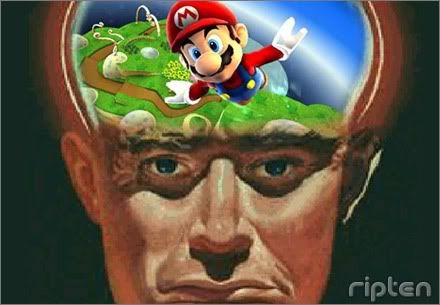 So... what happens in our brains when we
game?
So... what happens in our brains when we
game?  You have probably heard before that the brain
cannot distinguish between fact and fiction; it simply responds to what you (or something else) tell it. You can test this by imagining a reunion
between yourself and a loved one and then observing as your heart rate increases. Or, perhaps, remembering a stressful or dangerous situation you
were in and then noticing some sweat on your forehead. With digital gaming, you are presenting realities to your brain and it responds. Many people
can relate to the physical rise in energy one experiences when somebody keeps fragging (“killing”, for the layperson) them over and over without
remorse in a competitive online game. Just like any other reality, your body is reacting to your brain... a brain that is convinced of whatever is in
front of it, real or not.
You have probably heard before that the brain
cannot distinguish between fact and fiction; it simply responds to what you (or something else) tell it. You can test this by imagining a reunion
between yourself and a loved one and then observing as your heart rate increases. Or, perhaps, remembering a stressful or dangerous situation you
were in and then noticing some sweat on your forehead. With digital gaming, you are presenting realities to your brain and it responds. Many people
can relate to the physical rise in energy one experiences when somebody keeps fragging (“killing”, for the layperson) them over and over without
remorse in a competitive online game. Just like any other reality, your body is reacting to your brain... a brain that is convinced of whatever is in
front of it, real or not. In an article written by Mary E. Ballard and J. Rose Wiest in The Journal Of Applied Social Psychology, they describe a study conducted on cardiovascular effects from video gaming. They concluded their test thusly:
"We examined cardiovascular (CV) reactivity and hostility among 30 male undergraduates after either nonviolent (billiards) or 1 of 2 levels of violent videogame play. Violence varied among 2 versions of the game Mortal Kombat (MK1 = less violent, MK2 = more violent)—all other factors (graphics, sound) were held equal. As expected, increased game violence elicited greater CV reactivity and higher scores on hostility measures. Subjects who played MK1 or MK2 had higher heart rate reactivity than those who played billiards. Subjects who played MK2 showed greater systolic blood pressure reactivity than those who played MK1 or billiards" (717).
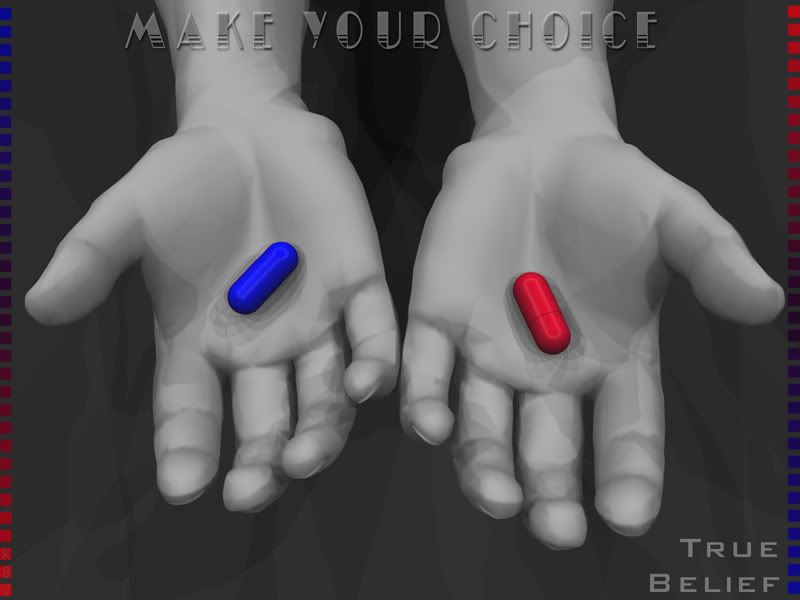 Of course, this was written with the purpose of
putting video games in a negative light just as most legitimate studies unfortunately have been geared toward until recently. Still, it sheds some
undeniable proof that our bodies and brains accept games as reality regardless of whether or not our consciousness believes that reality.
Of course, this was written with the purpose of
putting video games in a negative light just as most legitimate studies unfortunately have been geared toward until recently. Still, it sheds some
undeniable proof that our bodies and brains accept games as reality regardless of whether or not our consciousness believes that reality.  Do we react differently to single-protagonist
games?
Do we react differently to single-protagonist
games? In gaming, you have different perspectives as to who “you” are when you play them. They break down into three categories (roughly):
 1.
Single-protagonist. These are games in which the player takes control of one protagonist. This hero (or sometimes villain) is normally given a
detailed story that gets the player to identify and relate with him or her. The Tomb Raider series or any number of role-playing games are great
examples. I will be using Red Dead Redemption for reference.
1.
Single-protagonist. These are games in which the player takes control of one protagonist. This hero (or sometimes villain) is normally given a
detailed story that gets the player to identify and relate with him or her. The Tomb Raider series or any number of role-playing games are great
examples. I will be using Red Dead Redemption for reference.  2.
Multiple-protagonists. These are games in which the player takes control of more than one (sometimes several) character(s). These often include
real-time strategy games, turn-based strategy games (many RPGs), and even sports titles. The Sims is a great example. I will be using Battle For
Middle Earth II for reference.
2.
Multiple-protagonists. These are games in which the player takes control of more than one (sometimes several) character(s). These often include
real-time strategy games, turn-based strategy games (many RPGs), and even sports titles. The Sims is a great example. I will be using Battle For
Middle Earth II for reference.  3. Non-protagonist. These are titles where the
player has no character to play. These are normally puzzle games like Tetris. It would pretty much include any non-digital game, as well (with the
large exception of pen-and-paper role-playing games). This category will not be referenced due to many self-evident conclusions.
3. Non-protagonist. These are titles where the
player has no character to play. These are normally puzzle games like Tetris. It would pretty much include any non-digital game, as well (with the
large exception of pen-and-paper role-playing games). This category will not be referenced due to many self-evident conclusions.  Given the obscure nature of this question,
there are no studies specific enough to be utilized. What we do have, however, are personal experiences and I have found mine in this regard to
mirror those of many compatriots of mine.
Given the obscure nature of this question,
there are no studies specific enough to be utilized. What we do have, however, are personal experiences and I have found mine in this regard to
mirror those of many compatriots of mine.  When we play a
single-protagonist game, we are connected to the character in a way that is not possible with a novel or in a cinema production. You are interacting
with this person as if you were the character. When you are wrapped up in the emotions presented by the storyline's dictation of said protagonist,
you actually become happy when something positive happens and can become angry when wronged.
When we play a
single-protagonist game, we are connected to the character in a way that is not possible with a novel or in a cinema production. You are interacting
with this person as if you were the character. When you are wrapped up in the emotions presented by the storyline's dictation of said protagonist,
you actually become happy when something positive happens and can become angry when wronged. Red Dead Redemption is an example of Hollywood-qualitywriting in tandem with RockStar's signature ability to immerse the player into the game. John Marston (the protagonist) is an ex-outlaw who is being coerced by the then-forming FBI (this is 1911, mind you) to hunt down his old gang in exchange for his family, who is being kept by the agency. The connection I had with John Marston was similar to many fans of the game; deep and difficult to detach from.
I laughed, cried, and cursed more during my Red Dead Redemption experience than I ever have from any movie, book, or multi-protagonist game. My brain could not tell the difference between his experience and mine which is evident in the way it affected my physical responses.
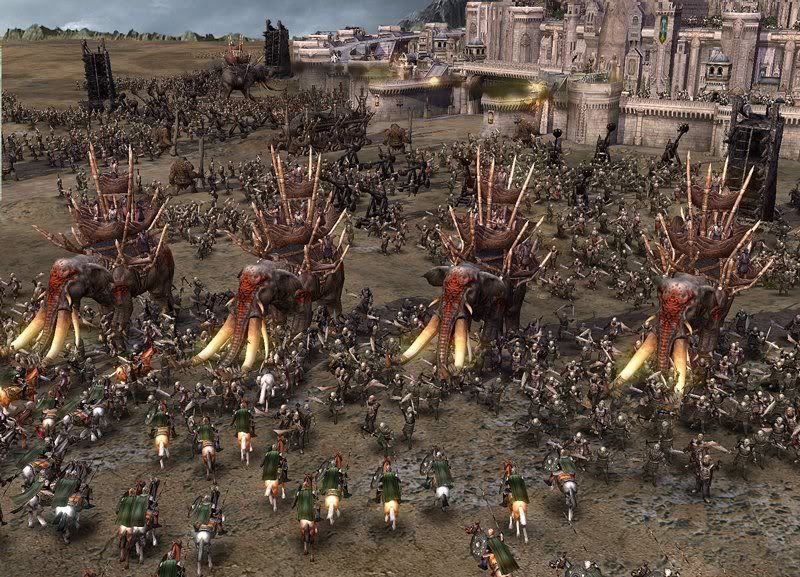 On the other end of the spectrum, is a great real-time
strategy game Battle for Middle Earth II. The game plays much like its digital colleagues (Command and Conquer, Star Craft, etc) with the exception
that it has an immense amount of lore to back it up. Several novels and three hit movies serve as the backdrop for Battle for Middle Earth II. The
reason I chose this as my multi-protagonist game is that, despite the lore and back story, it is still incapable of dragging me into any particular
character.
On the other end of the spectrum, is a great real-time
strategy game Battle for Middle Earth II. The game plays much like its digital colleagues (Command and Conquer, Star Craft, etc) with the exception
that it has an immense amount of lore to back it up. Several novels and three hit movies serve as the backdrop for Battle for Middle Earth II. The
reason I chose this as my multi-protagonist game is that, despite the lore and back story, it is still incapable of dragging me into any particular
character. Instead, I have a god-like satisfaction of commanding my minion orcs to go eat some nasty hobbits. Even when controlling Sauron, listening to him say “I see YOU” (BFMEII), it is not enough for me to really care about his motivation. This may be why it's so easy for me to be evil in these type of games. Why this does not translate into a direct experience that affects my emotions as a single-protagonist game does, I cannot say. I can only surmise that being detached from a particular character deadens emotions every bit as much as a great story invokes them.
 So... what the heck does all of that mean?
What is really real?!
So... what the heck does all of that mean?
What is really real?! Points to be checked up on the what-is-real-and-what-is-not board are myriad. This is especially true with the involvement of quantum mechanics. What does that board look like right now?
 - We have learned that our brains read and project our
surroundings in a Fourier mathematical fashion that is very analogous to how our television/monitor reads and projects a game. This would be the very
epitome of endogeny! A projector reading a projector.
- We have learned that our brains read and project our
surroundings in a Fourier mathematical fashion that is very analogous to how our television/monitor reads and projects a game. This would be the very
epitome of endogeny! A projector reading a projector.  - We have learned that our brain cannot tell
the difference between fact and fiction. This is not dependent on how well you are consciously aware of it.
- We have learned that our brain cannot tell
the difference between fact and fiction. This is not dependent on how well you are consciously aware of it.  - We have learned that
connectedness with a character trumps story when immersion is involved.
- We have learned that
connectedness with a character trumps story when immersion is involved. 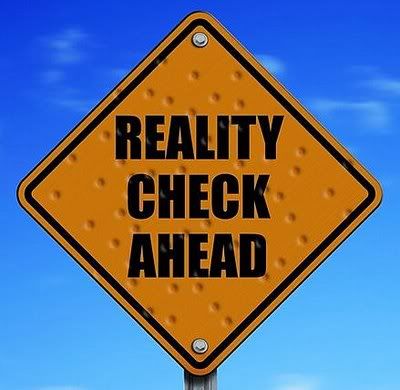 How could this be used to answer the original
inquiry of “Which reality is more in line with the implicit nature and relationship between matter and energy”? It can't. We can only
speculate. One thing I have learned during this exploration of video game reality is that, just because you have more confirmations of one reality,
it does not lessen another reality.
How could this be used to answer the original
inquiry of “Which reality is more in line with the implicit nature and relationship between matter and energy”? It can't. We can only
speculate. One thing I have learned during this exploration of video game reality is that, just because you have more confirmations of one reality,
it does not lessen another reality. No matter what reality you are experiencing, we are still reading the same wave-form physics and translating it in the same wave-form fashion and our wave-form brains simply respond. No. Matter. What. It almost seems as if it could be said they are equally valid. I have also concluded that this entire question is beyond intellectual chit-chat resolution and borders on the realm of spirituality.
 Perhaps Bonnie
McFarlane said it best when discussing spirituality with John Marston “We all have to look for answers somewhere. Some in big ol' books, others in
big ol' bottles of whiskey” (Red Dead Redemption). In other words, reality is as reality does...
Perhaps Bonnie
McFarlane said it best when discussing spirituality with John Marston “We all have to look for answers somewhere. Some in big ol' books, others in
big ol' bottles of whiskey” (Red Dead Redemption). In other words, reality is as reality does... Bibliography Talbot, Michael. The Holographic Universe. New York City: HarperCollins Publishers, 1992. 28. Print. Ballard, Mary E., and J. Rose Wiest. "Mortal Kombat (tm): The Effects of Violent Videogame Play on Males' Hostility and Cardiovascular Responding." Journal of Applied Social Psychology 26.8 Apr. (1996): 717. Print. Irion, Kimberly (Bonnie McFarlane), perf. Red Dead Redemption. RockStar Games, 2010. Blu-ray. Stanton, Stephen (Sauron), perf. Battle For Middle Earth II. EA Games, 2006. DVD-ROM.
Mods: feel free to move and/or copy this into the video games forum. I couldn't decide which one since it involves both digital gaming and physics.
In the time you spent playing video games, what did you do to help other people or benefit society in any way?
edit on 1-7-2011 by smithjustinb
because: (no reason given)
Originally posted by smithjustinb
In the time you spent playing video games, what did you do to help other people or benefit society in any way?edit on 1-7-2011 by smithjustinb because: (no reason given)
Are you asking me what I specifically did to benefit society while my hands were actively engaged in playing a digital game? Really?
I guess the answer would be that I did the same thing for society while playing games that I did while my hands were full reading a book, driving, playing frisbee, or any other number of activities that take up the use of my hands.
Did you even read the OP. It had nothing to do with benefits to society but if you want to get into that conversation, I'd be more than happy to help guide you in the right direction.
Originally posted by Cuervo
Originally posted by smithjustinb
In the time you spent playing video games, what did you do to help other people or benefit society in any way?edit on 1-7-2011 by smithjustinb because: (no reason given)
Are you asking me what I specifically did to benefit society while my hands were actively engaged in playing a digital game? Really?
I guess the answer would be that I did the same thing for society while playing games that I did while my hands were full reading a book, driving, playing frisbee, or any other number of activities that take up the use of my hands.
Did you even read the OP. It had nothing to do with benefits to society but if you want to get into that conversation, I'd be more than happy to help guide you in the right direction.
Video games may be real in the sense that you are experiencing something and identifying your self with them. But when it comes down to it, those fantasy characters are not aware of you and they are pre-programmed to carry out a limited number of actions. This is the flaw. The beauty about the natural reality is that the free will of its occupants allows them to carry out a less limited number of actions.
Therefore, I think it would be more beneficial to yourself and to society if you concentrated less on the "real" video game world where your actions are limited and focus more on the real natural world where your actions are only limited by your imagination.
Even if video games are "real", they are limited in possibilities.
Originally posted by smithjustinb
Originally posted by Cuervo
Originally posted by smithjustinb
In the time you spent playing video games, what did you do to help other people or benefit society in any way?edit on 1-7-2011 by smithjustinb because: (no reason given)
Are you asking me what I specifically did to benefit society while my hands were actively engaged in playing a digital game? Really?
I guess the answer would be that I did the same thing for society while playing games that I did while my hands were full reading a book, driving, playing frisbee, or any other number of activities that take up the use of my hands.
Did you even read the OP. It had nothing to do with benefits to society but if you want to get into that conversation, I'd be more than happy to help guide you in the right direction.
Video games may be real in the sense that you are experiencing something and identifying your self with them. But when it comes down to it, those fantasy characters are not aware of you and they are pre-programmed to carry out a limited number of actions. This is the flaw. The beauty about the natural reality is that the free will of its occupants allows them to carry out a less limited number of actions.
Therefore, I think it would be more beneficial to yourself and to society if you concentrated less on the "real" video game world where your actions are limited and focus more on the real natural world where your actions are only limited by your imagination.
Even if video games are "real", they are limited in possibilities.
I have to disagree on the basic point you made about limitations. Any digital game where you play a protagonist is not "pre-programmed". A pre-programmed video game is actually called a movie.
You are just as limited in the direct biological reality as you are in the digital one. Just in different ways. I can't shoot and drive like a rock star when I go out in town but I also can't take a leak in GTA.
I still think you aren't getting it as it wasn't a "this world is better than that world" but you are defending your favored reality as if I were attacking it. I was making the thesis on comparing the two realities as being valid and, if you made it to the end, was inconclusive. I think it's a compelling argument and I did not go into the research with a predetermined outcome.
But to attack gaming for it's lack of contribution to society is off-topic and also incorrect. Gaming (in it's analog or digital forms) has contributed every bit as much as theater arts, visual arts, music, and even poetry. It's an art. That's contribution even if nothing else was analyzed.
Originally posted by Cuervo
Originally posted by smithjustinb
Originally posted by Cuervo
Originally posted by smithjustinb
In the time you spent playing video games, what did you do to help other people or benefit society in any way?edit on 1-7-2011 by smithjustinb because: (no reason given)
Are you asking me what I specifically did to benefit society while my hands were actively engaged in playing a digital game? Really?
I guess the answer would be that I did the same thing for society while playing games that I did while my hands were full reading a book, driving, playing frisbee, or any other number of activities that take up the use of my hands.
Did you even read the OP. It had nothing to do with benefits to society but if you want to get into that conversation, I'd be more than happy to help guide you in the right direction.
Video games may be real in the sense that you are experiencing something and identifying your self with them. But when it comes down to it, those fantasy characters are not aware of you and they are pre-programmed to carry out a limited number of actions. This is the flaw. The beauty about the natural reality is that the free will of its occupants allows them to carry out a less limited number of actions.
Therefore, I think it would be more beneficial to yourself and to society if you concentrated less on the "real" video game world where your actions are limited and focus more on the real natural world where your actions are only limited by your imagination.
Even if video games are "real", they are limited in possibilities.
I have to disagree on the basic point you made about limitations. Any digital game where you play a protagonist is not "pre-programmed". A pre-programmed video game is actually called a movie.
You are just as limited in the direct biological reality as you are in the digital one. Just in different ways. I can't shoot and drive like a rock star when I go out in town but I also can't take a leak in GTA.
I still think you aren't getting it as it wasn't a "this world is better than that world" but you are defending your favored reality as if I were attacking it. I was making the thesis on comparing the two realities as being valid and, if you made it to the end, was inconclusive. I think it's a compelling argument and I did not go into the research with a predetermined outcome.
But to attack gaming for it's lack of contribution to society is off-topic and also incorrect. Gaming (in it's analog or digital forms) has contributed every bit as much as theater arts, visual arts, music, and even poetry. It's an art. That's contribution even if nothing else was analyzed.
But you aren't shooting up the town in that reality either. You're watching a two dimensional figure correspond to buttons you press. The reality is, that's all you're doing is pressing buttons. You can only attach yourself to this man-made creation so much.
Video games are man's creation. The world is God's creation.
Also, you are much more limited in your possible actions in a video game than you are on Earth. In GTA, you can only be a criminal and rob banks and stuff or w/e. You can be a criminal here too, or you can be anything you want to be. You could be the video game creator. That would at least help your creativity.
I used to play video games a lot, but then I realized that they were cutting me off from society and keeping me in a bad mood.
Originally posted by smithjustinb
Video games are man's creation. The world is God's creation.
That's not really a fair argument. Again, you are debating which world is better. My thesis never addresses that. But I'll play along and pose that perhaps any creation by man is an extension of your god's creation thus, in actuality, is created by your god.
Originally posted by smithjustinb
I used to play video games a lot, but then I realized that they were cutting me off from society and keeping me in a bad mood.
This explains why you are debating this. You are jaded by the culture itself and are most likely bitter and loath to concede to the notion that there is both value and validity to the gaming world. I never said it was everybody's cup of tea... just like meatspace (what I call the world outside my window) isn't everybody's gig. I simply said they share some equal footing and that it emulates reality in strikingly similar ways that our brain does.
People play games because they want to have fun or they feel more comfortable doing them than other things. I look at it more philosophically. I think
virtual reality is a key aspect of existence that's still new. It has a future. We can't even imagine. One day humans may live in virtual reality and
AI might live in real life. We just don't know. But this feeling that VR is not just another fad or drug is something I've always felt strongly. It
expands our reality exponentially.
That doesn't mean it won't get used wrongly or hurt people. Life eventually kills us all. But I think VR is a lot like the ocean or space. its potential is still clouded in mystery and its size still incomprehensible. It's a new frontier. It's a new way for our body and mind to evolve.
What if we found that all the universe could be had here, inside the smallest point? No immense spaceships are needed. No galactic empire. Just a single point.
And what if our body can't go through the space between, but special signals can?
Might there be an advantage to a human that's not bound to a body?
In these changing times not all of us will do well. Life never guarantees anything.
That doesn't mean it won't get used wrongly or hurt people. Life eventually kills us all. But I think VR is a lot like the ocean or space. its potential is still clouded in mystery and its size still incomprehensible. It's a new frontier. It's a new way for our body and mind to evolve.
What if we found that all the universe could be had here, inside the smallest point? No immense spaceships are needed. No galactic empire. Just a single point.
And what if our body can't go through the space between, but special signals can?
Might there be an advantage to a human that's not bound to a body?
In these changing times not all of us will do well. Life never guarantees anything.
edit on 1-7-2011 by jonnywhite because: (no reason
given)
Originally posted by jonnywhite
People play games because they want to have fun or they feel more comfortable doing them than other things. I look at it more philosophically. I think virtual reality is a key aspect of existence that's still new. It has a future. We can't even imagine. One day humans may live in virtual reality and AI might live in real life. We just don't know. But this feeling that VR is not just another fad or drug is something I've always felt strongly. It expands our reality exponentially.
That doesn't mean it won't get used wrongly or hurt people. Life eventually kills us all. But I think VR is a lot like the ocean or space. its potential is still clouded in mystery and its size still incomprehensible. It's a new frontier. It's a new way for our body and mind to evolve.
What if we found that all the universe could be had here, inside the smallest point?
And what if our body can't go through the space between, but special signals can?
Might there be an advantage to a human that's not bound to a body?
One thing is sure. In these changing times not all of us will do will. Life never guarantees anything.edit on 1-7-2011 by jonnywhite because: (no reason given)
Where you are going with that thought is something I think about quite often. I think any of us who make it through the next 15 years or so will see society as something unrecognizable when compared to today. Whether that's good or bad, it's definitely going to be cool.
Originally posted by Cuervo
Originally posted by jonnywhite
People play games because they want to have fun or they feel more comfortable doing them than other things. I look at it more philosophically. I think virtual reality is a key aspect of existence that's still new. It has a future. We can't even imagine. One day humans may live in virtual reality and AI might live in real life. We just don't know. But this feeling that VR is not just another fad or drug is something I've always felt strongly. It expands our reality exponentially.
That doesn't mean it won't get used wrongly or hurt people. Life eventually kills us all. But I think VR is a lot like the ocean or space. its potential is still clouded in mystery and its size still incomprehensible. It's a new frontier. It's a new way for our body and mind to evolve.
What if we found that all the universe could be had here, inside the smallest point?
And what if our body can't go through the space between, but special signals can?
Might there be an advantage to a human that's not bound to a body?
One thing is sure. In these changing times not all of us will do will. Life never guarantees anything.edit on 1-7-2011 by jonnywhite because: (no reason given)
Where you are going with that thought is something I think about quite often. I think any of us who make it through the next 15 years or so will see society as something unrecognizable when compared to today. Whether that's good or bad, it's definitely going to be cool.
Nothing human happens that fast! But who knows? I thinik we could go on as we're for a long long time. Futurists have been wrong most of the time. But if computers keep exponentially changing along with other things than we're sure to bump into something unexpected. I feel like we opened a door to infinity. It scared us so much we want to close it. But closing it might bar us from an evolution necessary to our survival, or conversely save us, depending on who you ask.
I'm not a new age person, btw. Just a computer freak and technology pimp. I see all of this as something that can expand us as opposed to something that will destroy us.
I get the same feeling from it that I do from space or anything far out.
But you know... few things are won easily or without pain. I don't want to give wrong impression.
There will be many fallen. Technology and VR will kill people too. It's not peace and rainbows.
But evolution never has been. It has always been hard.
edit on 1-7-2011 by jonnywhite because: (no reason given)
Originally posted by jonnywhite
Nothing human happens that fast! But who knows? I thinik we could go on as we're for a long long time. Futurists have been wrong most of the time. But if computers keep exponentially changing along with other things than we're sure to bump into something unexpected. I feel like we opened a door to infinity. It scared us so much we want to close it. But closing it might bar us from an evolution necessary to our survival, or conversely save us, depending on who you ask.
I'm not a new age person, btw. Just a computer freak and technology pimp. I see all of this as something that can expand us as opposed to something that will destroy us.
I get the same feeling from it that I do from space or anything far out.
But you know... few things are won easily or without pain. I don't want to give wrong impression.edit on 1-7-2011 by jonnywhite because: (no reason given)
I think you are right about the polarity of schools of thought on the save-or-destroy mentality. Personally, I think I'm of the mind that we need to evolve. I also think that we will soon find science and spirituality reaching each other at their respective apexes someday.
I think the most important thing to remember is that, in order to evolve into something better, you might have to "destroy" what you were. I can't imagine humanity reaching a globally evolved/enlightened state and still maintaining the familiar and comfortable life style values we hold so dear today. So maybe both schools are right.
I think religion is the belief in a virtual reality. With religion, you are choosing to believe that this place is created much like a game by a
creator. You are playing, but if you die, you just get reborn or the game ends and you see the creator in a different reality, are in a higher
dimension... You aren't your body if you believe in religion. The soul is the player, the body and reality is the game. the holograph. So to me if
you are choosing to believe in some form of religion you are saying that THIS is the virtual reality game. It doesn't matter if you die, you just go
to the next level. What scares me the most is if life is a one off. When I die I want to still exist somewhere. I want this to be the game. But what
if there is no afterlife. Then this is it, and when we die our energy permanently extinguishes.
reply to post by Cuervo
i'm experiencing a lot of immersion in a game right now called battlefield: bad company 2. I have detached from "reality" around me so much to the point, that sometimes I've caught myself moving my entire body out of the way of an incoming rocket being fired at me, from the monitor, laughed at that, and although I have over 2,000 hours logged on that game, I still to this day, when trying to climb a tricky area that requires some tactical jumping, and mashing of the keys, will find myself leaning into my keyboard, and grasping the keys as if I'm really climbing, and in order to get up the hill/cliff, if only I lean a bit harder into my keyboard, and grasp the WASD keys a bit hard, then I would surely get up said hill/cliff, hahah. Seriously, this happens every time I play it. Battlefield 2, and Bad Company 2 have sucked me in since 2007, but there's something VERY addicting about bad company 2. Granted it is a few generations past battlefield 2 in terms of graphics, physics, gameplay, I think they are incorporating some sounds which occur when you kill an enemy that might be pleasing to the ear/brain. It sounds like crystal coins being dropped into a bag. Yeah, weird for a first person military shooter, but I have tried to explain my addiction to this game. I know adrenaline is addictive, so addictive its the basis for many professions (emergency room staff, law enforcement, emergency services crews-ambulance/fire, infantry based military personnel) and thought maybe I was so immersed, my body was reacting physiologically to a super-imposed digital reality. Yes, I was happy when doing well, when not, the outside world, in intruding upon my excursion, would feel the wrath of my anger, by way of my frustration getting the better of me, and yelling a dismissive statement to leave me alone, etc, etc. Everything short of physically damaging my computer, or other household objects, only because my ego would not allow me, nor pocket book, to break my "toys" when I was mad, but I've yelled at the kids, became short with the wife, and when I joined a gaming clan (we join clans to competitively work together for maximum effectiveness on the "battlefield," things got worse. My dedication to my own success in a "game" was joined now with "real" people whom I communicated in real time through a program that allows voice chat, as well as moderated our website where we talked about game related subjects, etc etc, made friendships. Why did it get worse? I took the same immersion, "caring" about winning, and transposed them onto real people, and real people are not digital soldiers, they are like me. They do not do as told, they do not only care about one thing, "killing/highscores/rank/teameffectiveness" they are really "real" people with the same issues most hardcore military fps people have. WE MUST FRAG! (we must kill....). The best selling games in the video game market, be it console players, or pc/mac players are the Call of Duty series, and the Battlefield Series (1942, Vietnam, BF2, BF2142, Bad Company 1 & 2. I would like to have fun with other games, and have tried everything from Angry birds, World of Goo, to rpg games like Oblivion, and real time strategy like Starcraft ,and even massive multiplayer onling rpgs like Eve, World of Warcraft, but nothing kept me but the military FPS, as well as Zombie Killing FPS like Left4Dead 1 and 2. Ahh, racing games are a also something I love, more evidence of adrenaline producing games. I forgot to mention, I'm one of the many of people diagnosed with ADD as a child, and a methylphenidate HCl (ritalin) junkie as a child (don't use it anymore, nor any form of amphetamine). Seems like something like an immersing fps game that produces these levels of adrenaline, should have a regulation on them, bordering on FDA regulation, but you can't regulate it, as it does not have drugs in it, only makes the brain produce them, thus addicting the user. Some gamers are addicted not by adrenaline, but by serotonin or dopamine probably, as is the case for the hardcore mmorpg players (we've read/heard the stories of divorces, lost jobs, breakups, and even one couple was arrested for not feeding their infant that died because of the infant's parent's addiction to World of Warcraft-true, sadly).
Now, why did I write all this... There is a connection with fps, especially military fps, and a possible training for a great war. I know, sounds a little out there, and is along the lines of end world military/survival type threads, which I'm not a proponent of, but have an open mind, and do not know what will become of our world, but it seems to have a straight trajectory to the #ter, whether it be the fulfilling of a prophecy, or just the nature of the beast of man, to kill ourselves over greed, through war, etc.
There was a test, and it's been redone different ways, but two sets of basketball players for a month, or X amount of time were to practice free throw shots. One group physically practiced them, while the other group only practiced the shots "in their mind." Guess which one did better on the physical test at the end, yip...the ones who imagined it.
Not shocking, when I remember how I learned better by watching videos of surfers, than I did just trying to go out into the waves on a short board in california, being pummeled by waves, over and over, and get the "hang" of it, but I became frustrated after hundreds of ours, and not catching a wave (easy to catch a wave on a long board, not so easy when your a bit over weight and doing it on a used short board you bought that wasn't the right fit for your body length, so I quit trying to surf, but still watched videos, and what happened the very day I tried and got back in the water, after not touching my board for two months? I caught my first wave, not only catching it, but shredding it as well. My mind had studied the mechanics of the joints of the surfer's body and how they reacted to the mechanics of a moving wave, and all of that information was stored, and built a physical model for reaction and response in my brain which was carried out physically by a mentally indulged event.
If there is a war, whatever reason, on whatever terms, many kids (i'm an old man of 37) will have a natural ability to react to enemies with guns, if they are given guns, if they over come the shock factor of "this is real, and I have only one life!"
The perfect "mental" soldier is being made. Military FPS shooters aren't completely mindless, requiring only fine motor skills, and a good marksmanship ability, but the best players are tactical, and employ not only marksmanship, but military strategy in real time, and in conjunction with your squad mates, as well as team mates in dynamic environments (destruction 2.0 is now the hot thing in fps games, this is the ability to destroy your environment, which is buildings, trees, shrubs, etc).
When you combine this immersion with a personal connection through voice chat with team mates, it makes it even more intense, and a bigger reason to keep player, it incorporates drugs (adrenaline) with the psychological aspect of pride, competition, etc.
Reminds me of the scene in the movie "Avatar" when they show soldiers on the "battlefield" are actually just laying in a chamber controlling a robot on a physical battlefield with their minds, like a video game. (I think that's from Avatar, might be wrong, but you see the point)
I once had a thought, why do we do what we do, and the universe does, back in my philosophy days, believing matter was intelligent, and leaving "god" out of the equation, what would intelligent matter do in the lonely vacuum of time? I thought, we'll if I was intelligent energy, all alone in a vacuum of time, I would convert myself to energy, and create a way to forget where I was, what I was in the form of what we see today, and seeing what we do, everything from molecular interaction, to mating, to survival, it all seemed a game, so I believed that this intelligent energy, was playing games to kill time.
It's what you have to do to keep order in your mind, anyone who's been in jail or forcibly put in a place with no interaction with the outside world, you have to play games using your mind to keep from going crazy. You have to "do the time, or the time will do you."
Then later I read about the double slit experiment, and it solidified my pontifications of intelligent matter (the photons reacting differently when observed, evidence, but not proof of intelligent matter), but basically I was trying to put my feeble mind of a human, into the mind of a omnipotent being...what the hell would I do with nothing at all, but consciousness, and a LOT of time on my hands, essentially trying to "understand" the nature of the universe's intentions, all the physics were not to hard to understand, the math, the psychology, cosmology, but the question drove me a bit nuts, WHY? WHY WHY?!!! I didn't care where we came from, or where we were going to...that's known, point A birth, point B death...simple, but WHY? Not in the sense that's known, we all know how and why we are born, and die through knowledge of physiology, and even a pretty good guess at the how of death and birth of our universe, but why?.
Then I watched "A beautiful mind," and game theory popped in my brain, then I tried to apply it to cosmology, and then double slit, where the photons played a game of "bet you can't guess my behavior," then when you guess it's behavior, the photons then said "guess you can't bet where I am in space time" (or something like that). Seems like a game, the more we know about reality, the more interesting and perplexing the game becomes, we find out about the building blocks of physics with newton, then einstein comes along,with a twist, and adds more to the equation, then comes quantum mechanics, and string theory, and the ultimate in mind blowing physics, holographic universe theory, and I'm sure it will get crazier, if we don't quit searching for answers that are irrelevant to our physical lives journeys through time. I quit philosophy, and searching for answers when I became a father. A very visceral truth became known, my purpose in this crazy journey of life was now well defined, purpose: protect, guide, father. Another answer was apparent in the birth of my child, the meaning of life, was simply, "life." There is no crazy philosophical, or mathematically puzzling long theorem involving complex physics, it was just life. My mind was no longer in the clouds, but firmly attached to a brain which resided in a physically heavy body which walked on a hard dirt earth in a more immersing reality then the reality in my mind of what ifs, philosophy, sociology, psychology, cosmology, physics, biology, etc. I put down the philosophers crack pipe, and picked up life. No longer going in circles (that's what happens in philosophy, and math, and physics, everything goes in circles, eventually, every questions answer is given another question which raises an answer to another question with a waiting answer, this linear process is just a cyclic generation of going in circles in the mind, a bad place to go in circles, as the mind is larger than any number of combined universe, and can be smaller than any planck distance depending, so the best is just to live as if this chance will never come again, to feel good things on the skin, smell the fragrances of life through the nose, to taste the delicacies with the tongue, to enjoy the sites of the world with your eyes.
I'm not against the mental aspects of pleasure in this life of senses, but I've put up the toys of philosophy in my mind's attic, and not a heathen, enjoying only the visceral, but also no longer a slave to that insane question of why. Now, instead of why, I say, "why ask why?"
I don't know how long I've been writing, nor the length, and it's a jump from video games to where I've ended, but I will conclude. I got on this page from a posting with a link as a signature (the person who started this thread, his/her link to this thread, and really loved Talbot's book, ho9lographic universe, and thought about my recent "problems" with video games (addiction, and taking out anger on other around me, etc after reading his/her post).. It will be interesting to see how much I've written, and the tangents I've gone on. Okay, I will stop now, gotta go do some digging in the yard.
i'm experiencing a lot of immersion in a game right now called battlefield: bad company 2. I have detached from "reality" around me so much to the point, that sometimes I've caught myself moving my entire body out of the way of an incoming rocket being fired at me, from the monitor, laughed at that, and although I have over 2,000 hours logged on that game, I still to this day, when trying to climb a tricky area that requires some tactical jumping, and mashing of the keys, will find myself leaning into my keyboard, and grasping the keys as if I'm really climbing, and in order to get up the hill/cliff, if only I lean a bit harder into my keyboard, and grasp the WASD keys a bit hard, then I would surely get up said hill/cliff, hahah. Seriously, this happens every time I play it. Battlefield 2, and Bad Company 2 have sucked me in since 2007, but there's something VERY addicting about bad company 2. Granted it is a few generations past battlefield 2 in terms of graphics, physics, gameplay, I think they are incorporating some sounds which occur when you kill an enemy that might be pleasing to the ear/brain. It sounds like crystal coins being dropped into a bag. Yeah, weird for a first person military shooter, but I have tried to explain my addiction to this game. I know adrenaline is addictive, so addictive its the basis for many professions (emergency room staff, law enforcement, emergency services crews-ambulance/fire, infantry based military personnel) and thought maybe I was so immersed, my body was reacting physiologically to a super-imposed digital reality. Yes, I was happy when doing well, when not, the outside world, in intruding upon my excursion, would feel the wrath of my anger, by way of my frustration getting the better of me, and yelling a dismissive statement to leave me alone, etc, etc. Everything short of physically damaging my computer, or other household objects, only because my ego would not allow me, nor pocket book, to break my "toys" when I was mad, but I've yelled at the kids, became short with the wife, and when I joined a gaming clan (we join clans to competitively work together for maximum effectiveness on the "battlefield," things got worse. My dedication to my own success in a "game" was joined now with "real" people whom I communicated in real time through a program that allows voice chat, as well as moderated our website where we talked about game related subjects, etc etc, made friendships. Why did it get worse? I took the same immersion, "caring" about winning, and transposed them onto real people, and real people are not digital soldiers, they are like me. They do not do as told, they do not only care about one thing, "killing/highscores/rank/teameffectiveness" they are really "real" people with the same issues most hardcore military fps people have. WE MUST FRAG! (we must kill....). The best selling games in the video game market, be it console players, or pc/mac players are the Call of Duty series, and the Battlefield Series (1942, Vietnam, BF2, BF2142, Bad Company 1 & 2. I would like to have fun with other games, and have tried everything from Angry birds, World of Goo, to rpg games like Oblivion, and real time strategy like Starcraft ,and even massive multiplayer onling rpgs like Eve, World of Warcraft, but nothing kept me but the military FPS, as well as Zombie Killing FPS like Left4Dead 1 and 2. Ahh, racing games are a also something I love, more evidence of adrenaline producing games. I forgot to mention, I'm one of the many of people diagnosed with ADD as a child, and a methylphenidate HCl (ritalin) junkie as a child (don't use it anymore, nor any form of amphetamine). Seems like something like an immersing fps game that produces these levels of adrenaline, should have a regulation on them, bordering on FDA regulation, but you can't regulate it, as it does not have drugs in it, only makes the brain produce them, thus addicting the user. Some gamers are addicted not by adrenaline, but by serotonin or dopamine probably, as is the case for the hardcore mmorpg players (we've read/heard the stories of divorces, lost jobs, breakups, and even one couple was arrested for not feeding their infant that died because of the infant's parent's addiction to World of Warcraft-true, sadly).
Now, why did I write all this... There is a connection with fps, especially military fps, and a possible training for a great war. I know, sounds a little out there, and is along the lines of end world military/survival type threads, which I'm not a proponent of, but have an open mind, and do not know what will become of our world, but it seems to have a straight trajectory to the #ter, whether it be the fulfilling of a prophecy, or just the nature of the beast of man, to kill ourselves over greed, through war, etc.
There was a test, and it's been redone different ways, but two sets of basketball players for a month, or X amount of time were to practice free throw shots. One group physically practiced them, while the other group only practiced the shots "in their mind." Guess which one did better on the physical test at the end, yip...the ones who imagined it.
Not shocking, when I remember how I learned better by watching videos of surfers, than I did just trying to go out into the waves on a short board in california, being pummeled by waves, over and over, and get the "hang" of it, but I became frustrated after hundreds of ours, and not catching a wave (easy to catch a wave on a long board, not so easy when your a bit over weight and doing it on a used short board you bought that wasn't the right fit for your body length, so I quit trying to surf, but still watched videos, and what happened the very day I tried and got back in the water, after not touching my board for two months? I caught my first wave, not only catching it, but shredding it as well. My mind had studied the mechanics of the joints of the surfer's body and how they reacted to the mechanics of a moving wave, and all of that information was stored, and built a physical model for reaction and response in my brain which was carried out physically by a mentally indulged event.
If there is a war, whatever reason, on whatever terms, many kids (i'm an old man of 37) will have a natural ability to react to enemies with guns, if they are given guns, if they over come the shock factor of "this is real, and I have only one life!"
The perfect "mental" soldier is being made. Military FPS shooters aren't completely mindless, requiring only fine motor skills, and a good marksmanship ability, but the best players are tactical, and employ not only marksmanship, but military strategy in real time, and in conjunction with your squad mates, as well as team mates in dynamic environments (destruction 2.0 is now the hot thing in fps games, this is the ability to destroy your environment, which is buildings, trees, shrubs, etc).
When you combine this immersion with a personal connection through voice chat with team mates, it makes it even more intense, and a bigger reason to keep player, it incorporates drugs (adrenaline) with the psychological aspect of pride, competition, etc.
Reminds me of the scene in the movie "Avatar" when they show soldiers on the "battlefield" are actually just laying in a chamber controlling a robot on a physical battlefield with their minds, like a video game. (I think that's from Avatar, might be wrong, but you see the point)
I once had a thought, why do we do what we do, and the universe does, back in my philosophy days, believing matter was intelligent, and leaving "god" out of the equation, what would intelligent matter do in the lonely vacuum of time? I thought, we'll if I was intelligent energy, all alone in a vacuum of time, I would convert myself to energy, and create a way to forget where I was, what I was in the form of what we see today, and seeing what we do, everything from molecular interaction, to mating, to survival, it all seemed a game, so I believed that this intelligent energy, was playing games to kill time.
It's what you have to do to keep order in your mind, anyone who's been in jail or forcibly put in a place with no interaction with the outside world, you have to play games using your mind to keep from going crazy. You have to "do the time, or the time will do you."
Then later I read about the double slit experiment, and it solidified my pontifications of intelligent matter (the photons reacting differently when observed, evidence, but not proof of intelligent matter), but basically I was trying to put my feeble mind of a human, into the mind of a omnipotent being...what the hell would I do with nothing at all, but consciousness, and a LOT of time on my hands, essentially trying to "understand" the nature of the universe's intentions, all the physics were not to hard to understand, the math, the psychology, cosmology, but the question drove me a bit nuts, WHY? WHY WHY?!!! I didn't care where we came from, or where we were going to...that's known, point A birth, point B death...simple, but WHY? Not in the sense that's known, we all know how and why we are born, and die through knowledge of physiology, and even a pretty good guess at the how of death and birth of our universe, but why?.
Then I watched "A beautiful mind," and game theory popped in my brain, then I tried to apply it to cosmology, and then double slit, where the photons played a game of "bet you can't guess my behavior," then when you guess it's behavior, the photons then said "guess you can't bet where I am in space time" (or something like that). Seems like a game, the more we know about reality, the more interesting and perplexing the game becomes, we find out about the building blocks of physics with newton, then einstein comes along,with a twist, and adds more to the equation, then comes quantum mechanics, and string theory, and the ultimate in mind blowing physics, holographic universe theory, and I'm sure it will get crazier, if we don't quit searching for answers that are irrelevant to our physical lives journeys through time. I quit philosophy, and searching for answers when I became a father. A very visceral truth became known, my purpose in this crazy journey of life was now well defined, purpose: protect, guide, father. Another answer was apparent in the birth of my child, the meaning of life, was simply, "life." There is no crazy philosophical, or mathematically puzzling long theorem involving complex physics, it was just life. My mind was no longer in the clouds, but firmly attached to a brain which resided in a physically heavy body which walked on a hard dirt earth in a more immersing reality then the reality in my mind of what ifs, philosophy, sociology, psychology, cosmology, physics, biology, etc. I put down the philosophers crack pipe, and picked up life. No longer going in circles (that's what happens in philosophy, and math, and physics, everything goes in circles, eventually, every questions answer is given another question which raises an answer to another question with a waiting answer, this linear process is just a cyclic generation of going in circles in the mind, a bad place to go in circles, as the mind is larger than any number of combined universe, and can be smaller than any planck distance depending, so the best is just to live as if this chance will never come again, to feel good things on the skin, smell the fragrances of life through the nose, to taste the delicacies with the tongue, to enjoy the sites of the world with your eyes.
I'm not against the mental aspects of pleasure in this life of senses, but I've put up the toys of philosophy in my mind's attic, and not a heathen, enjoying only the visceral, but also no longer a slave to that insane question of why. Now, instead of why, I say, "why ask why?"
I don't know how long I've been writing, nor the length, and it's a jump from video games to where I've ended, but I will conclude. I got on this page from a posting with a link as a signature (the person who started this thread, his/her link to this thread, and really loved Talbot's book, ho9lographic universe, and thought about my recent "problems" with video games (addiction, and taking out anger on other around me, etc after reading his/her post).. It will be interesting to see how much I've written, and the tangents I've gone on. Okay, I will stop now, gotta go do some digging in the yard.
Originally posted by smithjustinb
In the time you spent playing video games, what did you do to help other people or benefit society in any way?edit on 1-7-2011 by smithjustinb because: (no reason given)
so does your every activity benefit society and help people? if so, please tell, you should have a medal or something.
you shouldn't disrespect people over things like this.
and ya know what, maybe playing video games made this person happy, then they were more courteous and loving to others that they met in the wake of their gaming experience due to the pleasure that they received.. didn't think about that one did ya? SHAZAM! ; )
reply to post by N34Li3Z
That's funny you mentioned the basketball free throw experiment. I had just read extensively about that when doing research for the paper. Almost included it, in fact. It demonstrates, completely, how the brain does not know the difference, only you do.
Your connection to military conspiracy has crossed my mind before. Especially when America's Army (made by our military) came out for free. It's like they didn't even care if we came to that conclusion. And to be honest (shame on me), knowing that didn't change my opinion of it being a fun game.
Just temper it all with varying realities and you should be just fine.
That's funny you mentioned the basketball free throw experiment. I had just read extensively about that when doing research for the paper. Almost included it, in fact. It demonstrates, completely, how the brain does not know the difference, only you do.
Your connection to military conspiracy has crossed my mind before. Especially when America's Army (made by our military) came out for free. It's like they didn't even care if we came to that conclusion. And to be honest (shame on me), knowing that didn't change my opinion of it being a fun game.
Just temper it all with varying realities and you should be just fine.
Originally posted by nrd101
I think religion is the belief in a virtual reality. With religion, you are choosing to believe that this place is created much like a game by a creator. You are playing, but if you die, you just get reborn or the game ends and you see the creator in a different reality, are in a higher dimension... You aren't your body if you believe in religion. The soul is the player, the body and reality is the game. the holograph. So to me if you are choosing to believe in some form of religion you are saying that THIS is the virtual reality game. It doesn't matter if you die, you just go to the next level. What scares me the most is if life is a one off. When I die I want to still exist somewhere. I want this to be the game. But what if there is no afterlife. Then this is it, and when we die our energy permanently extinguishes.
You actually just described a valid physics model that involves spirituality. It's an offshoot of Bohm's with Dr. Moody's works thrown in for good measure.
Personally, that's why I think we design games the way we do. It's a subconscious desire to imitate the true nature of reality (reincarnation, immortal "players" in this MMO I call Meatspace).
Originally posted by SOILDERSUNITEDFORCHRIST
reply to post by Cuervo
you are living in a world of fantasy.
I know. That was my point. Which fantasy world are you talking about, though?
reply to post by Cuervo
im sorry brother i hate to get to the point right away but if you spent your life on the streets and learning from your every day struggles instead of hiding behind video games and a computer you would probably understand, but then again, god chose us before he created the heavens and the earth, i will pray to GOD foe your soul if only you would give him a chance,while you still have time.......
im sorry brother i hate to get to the point right away but if you spent your life on the streets and learning from your every day struggles instead of hiding behind video games and a computer you would probably understand, but then again, god chose us before he created the heavens and the earth, i will pray to GOD foe your soul if only you would give him a chance,while you still have time.......
new topics
-
Paramilitary Leaks - John Williams
Whistle Blowers and Leaked Documents: 5 hours ago -
Some sausage, some chicken, some sauce, some onions and some garlic...and some peppers!
Food and Cooking: 7 hours ago -
Hearing more ambulances lately
Medical Issues & Conspiracies: 7 hours ago -
Los Angeles brush fires latest: 2 blazes threaten structures, prompt evacuations
Mainstream News: 7 hours ago -
House Passes Laken Riley Act
Mainstream News: 8 hours ago -
The more I think about it
General Chit Chat: 8 hours ago -
What Comes After January 20th
Mainstream News: 10 hours ago -
Canada as a state .. how would it work?
General Chit Chat: 11 hours ago -
Those stupid GRAVITE commercials
Rant: 11 hours ago
top topics
-
House Passes Laken Riley Act
Mainstream News: 8 hours ago, 23 flags -
What Comes After January 20th
Mainstream News: 10 hours ago, 18 flags -
Claim: General Mark Milley Approved Heat and Sound Directed Energy Weapons During 2020 Riots
Whistle Blowers and Leaked Documents: 17 hours ago, 12 flags -
Planned Civil War In Britain May Be Triggered Soon
Social Issues and Civil Unrest: 15 hours ago, 7 flags -
Let's Buy Greenland
General Chit Chat: 12 hours ago, 6 flags -
Those stupid GRAVITE commercials
Rant: 11 hours ago, 5 flags -
Hearing more ambulances lately
Medical Issues & Conspiracies: 7 hours ago, 5 flags -
Los Angeles brush fires latest: 2 blazes threaten structures, prompt evacuations
Mainstream News: 7 hours ago, 5 flags -
The more I think about it
General Chit Chat: 8 hours ago, 4 flags -
Canada as a state .. how would it work?
General Chit Chat: 11 hours ago, 4 flags
active topics
-
Los Angeles brush fires latest: 2 blazes threaten structures, prompt evacuations
Mainstream News • 12 • : Mantiss2021 -
Judge rules president-elect Donald Trump must be sentenced in 'hush money' trial
US Political Madness • 60 • : WeMustCare -
Planned Civil War In Britain May Be Triggered Soon
Social Issues and Civil Unrest • 14 • : WeMustCare -
Inca stone masonry at Sacsayhuaman, Ollantaytambo and the Sun Temple
Ancient & Lost Civilizations • 23 • : Hansllune -
Paradox of Progress
Ancient & Lost Civilizations • 14 • : Hansllune -
Let's talk planes.
General Chit Chat • 10 • : Dalamax -
Paramilitary Leaks - John Williams
Whistle Blowers and Leaked Documents • 8 • : caterpillage -
Claim: General Mark Milley Approved Heat and Sound Directed Energy Weapons During 2020 Riots
Whistle Blowers and Leaked Documents • 25 • : NoCorruptionAllowed -
Meta Llama local AI system is scary good
Science & Technology • 47 • : glend -
House Passes Laken Riley Act
Mainstream News • 15 • : KrustyKrab
